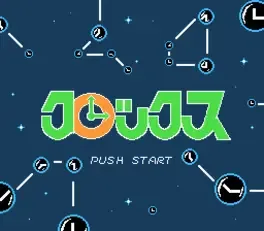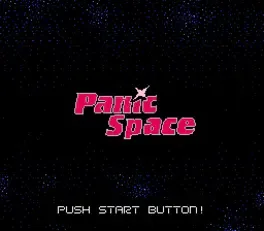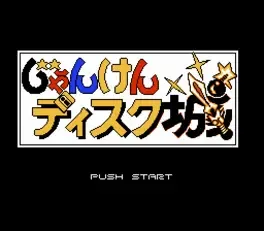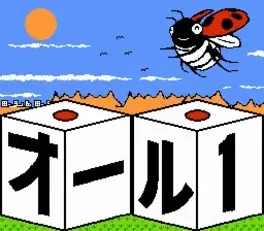Popular games for collection Famimaga Disk

The fourth game featured as a coverdisk on the Japanese magazine Famimaga, Clocks is a Tetris variant in which clock faces must be placed together form larger shapes. Clocks, or Famimaga Disk Vol. 4 Clocks (and occasionally as "Clox"), is a falling blocks puzzle game that is superficially similar to Tetris or Columns. Single clock faces depicting one of four angles fall from the top and the player needs to manipulate and place them so they can form larger objects, such as simple formations like squares, diamonds and hourglass shapes to more object-intensive shapes like octagons and hexagons. The four angles include 180 degree lines ("12:30"), 90 degree lines ("12:15"), 135 degree lines ("~12:22") and 45 degree lines ("~12:07"). Once a clock face is placed, the lines from it extend to connect to any other lines that surround it. Placing lines in such a way that it forms a shape - for example, placing four 90 degree clocks in such a way to form a square - earns the player points and removes the clocks used to form the shape. Larger shapes are more risky but earn more points. The player is given some leeway to recover from mistakes: should the player hold the down button to make a clock fall faster, it'll destroy any clocks underneath. A misplacement, therefore, can be rectified with a correctly positioned clock if it falls quickly enough to crush the offending clock. However, the player can only do this a limited number of times per stage.

The second game to be released as a coverdisk special for the Japanese Famimaga magazine. Panic Space is a game based around the laser deflection puzzles that are common in games in the Zelda series as well as others. Panic Space, or Famimaga Disk Vol. 2 Panic Space, is a puzzle game in which the goal is to reflect a laser to an exit panel in order to open the way to the next stage. The laser cannot hit any of the stage's surrounding wall: were it do so, it would cause the level to explode and the player to lose a life (from an initial allotment of five, though this can be increased while playing the game). Much of the time the various reflectors (which send the beam off at a 90 degree angle) and blocks (which simply stop the laser in its tracks) must be maneuvered into place before the laser should be tested on them. The robotic protagonist also has access to three different power-ups. These appear on every level and quickly cycles through the three types - the player must grab it when it stops on the desired power-up. These include a stopwatch that extends the time the player has to complete the stage, a bomb can that can eliminate one block and is occasionally necessary to beat stages and a galaxy spiral that can be placed anywhere to temporarily stop the laser.

The sixth and final game featured as the coverdisk of the Japanese Famimaga magazine. Janken Disk Shiro is a block-pushing puzzle game based on the playground game Janken (Rock, Paper, Scissors). Janken Disk Shiro, or Famimaga Disk Vol. 6 Janken Disk Shiro, is a puzzle game in which the protagonist (who looks uncannily like Disk-kun, the mascot of the Famicom Disk System) must brave a labyrinth of puzzles. In each room there are three variants of hand-shaped blocks between the hero and the exit: each one either making the "scissors" gesture, the "rock" gesture or the "paper" gesture. Pushing a block adjacent to another of a different type causes whichever was the inferior (e.g. with paper and rock, rock is the inferior) to vanish. In addition, each block has a "strength" which is signified by its color: green is level 1, yellow is level 2 and red is level 3. If a green block is pushed next to an inferior red block, the red block will instead become yellow instead of vanishing (and then green with a subsequent superior block, and then will vanish after a third). Gameplay revolves around finding the right blocks to push together to clear a way to the exit. Not every block needs to be eliminated: just those that are direct obstacles between the player and the end of the stage. The game adopts a familiar veneer of the typical 8-bit fantasy RPG: The player starts in a small town in which they can talk to NPCs and purchase power-ups, they can visit the King in his castle to begin their quest and they can visit the dungeons in which the puzzles are found (after receiving permission from the King). Janken Disk Shiro has the distinction of being the very last game ever produced for the Famicom Disk System. The peripheral had been effectively retired by the 90s due to advancements in NES cart technology.

The third game to be released as a coverdisk for the Japanese Famimaga magazine. All One is a block-pushing puzzle game in which every die must have their "one" side facing upwards. All One, or Famimaga Disk Vol. 3 All One, is a puzzle game in which the player controls a ladybug pushing over dice. The goal of each stage is to push all the dice onto their side so that their "one" side is facing upwards. The player is given a smaller first-person view window from the ladybug's perspective to allow them to see the sides of each die and plan out their strategy. As with other block-pushing puzzle games, the game becomes similar to Sokoban or Adventures of Lolo in its complexity as it progresses: there is often only a few (or just one) paths to successfully solving a stage and the player will need to restart if they make a mistake.

The first game to be produced as a coverdisk for Japanese Famicom magazine Famimaga, Hong Kong is a points-based variant of Mahjong Solitaire (a.k.a. Shanghai) that also plays a little bit like Jenga. Hong Kong, or Famimaga Disk Vol. 1 Hong Kong, is a Shanghai variant in which players must remove specified tiles from a pattern. The player can select which pattern (from pyramids and hourglasses to more complex designs) from which to draw tiles as well as inputting a three letter code which offers several thousand possible combinations of the tiles within that pattern. Rather than removing tiles in pairs on the edge of the pattern in order to access buried tiles, as is the norm in Shanghai, the player can select any tile on the board as long as it corresponds to the tile the game requests. However, points are scored based on how many other tiles surround the selected tile: A maximum of 320 points are awarded for tiles completely surrounded on all six sides by other tiles. Any tiles that aren't "standing" on at least one other tile will fall off the board causing a premature game over: players need to balance earning points by removing entrenched tiles while ensuring that no tile will fall off the table as a result of the removal. Because the game is not a true version of Shanghai it is named after another Chinese city - Hong Kong - instead.